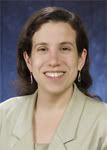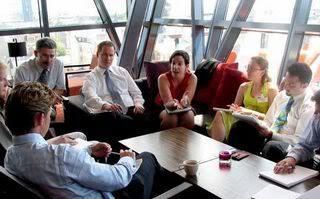FairJewelry.Org Exclusive: Interview with Carmen Iezzi, Executive Director of the Fair Trade Federation
In 2006, Carmen Iezzi, was named executive director of the Fair Trade Federation, which represents more than 250 fair trade businesses in North America.

Carmen Iezzi
An Alumni of American University, she knew she had an important and significant job to do. She envisioned her role as the youngest person there; to lead the group with fresh eyes and new energy, working towards an important cause during a key time of growth.
I conducted this interview with her over the telephone and through email:
FJ: Please give me a brief explanation of what the Fair Trade Federation does and your position with the organization.
Carmen: Il Fair Trade Federation is an international association of businesses and organizations that are fully committed to fair trade. Since 1994, FTF has been working to educate consumers and vendors about fair trade and to support our members. I have been the executive director since October 2006.
FJ: Many products designated as fair trade on your FAQ page are not covered by the labeling organization (Transfair USA e la European Fair Labeling Organization). Isn’t that kind of confusing? Please explain because, at least on the surface, it seems as if you are at cross purposes.
Carmen: FLO may certify a kilo of coffee beans, sugar cane, or other commodity product, which could then be sold to a conventional or a fair trade company. FTF examines a company’s practices for their full commitment to fair trade. The items listed on our website come from members of FTF.
FJ: There is no agreed upon definition of fair trade jewelry, and yet it is listed as a commercio equo e solidale product in your FAQs. There are companies in your organization, such as Global Exchange, that list the Transfair USA logo on their site, suggesting that all their products are third party certified yet they are not. When questioned about their fair trade practices in a category such as jewelry, they point to your website to give themselves credibility on their fair trade status for the products they sell. How am I to make sense of this as a consumer interested in supporting fair trade?
Carmen: Global Exchange sells some certified commodities and is therefore entitled to use the Transfair logo, as I understand Transfair’s policies. Global Exchange is also a member of FTF and entitled to use our logo in relation to their organization.
FJ: What are the criteria for fair trade designation and how these principles might they apply to jewelry?
Carmen: FTF members are fully committed to
• Paying fair wages in local context;
• Supporting participatory workplaces;
• Ensuring environmental sustainability;
• Supplying financial and technical support;
• Respecting cultural identity;
• Offering public accountability;
• Building direct and long-term relationships and,
• Educating consumers.

Carmen in action at the NATO summit in Riga, Latvia
FJ: If it is the businesses that you certify as a member of your federation that if a product is “fair trade” how do you monitor their practices of that business to assure it really is—since Transfair and FLO are not involved?
Carmen: As a reminder, FTF does not certify businesses. We screen an applicant’s business practices and their commitment to fair trade using qualitative and quantitative information and external references. The processes that FLO employs are complementary, but distinct, from our work.
FJ: When I met with a representative of Transfair USA at the Fair Trade Jewelry Conference sponsored by the Rapaport Group in Las Vegas last June, there was some concern about any jewelry company using the “fair trade” designation as a means of “green washing.” Do you have any opinion about this?
Carmen: Consumers should discourage companies who seek to have a small part of their work offset other, less sustainable practices.
FJ: Is there anything else that you would like to add?
Carmen: Fair trade has a long history in North America and a bright future. Fair trade items have been available in the United States since 1946 da Ten Thousand Villages and the first fair trade coffee company, Equal Exchange, opened in 1986. FLO was created in 1988; e, TransFairs USA and Canada opened their doors in 1999. The fair trade movement seeks to create positive change in the lives of producers by growing fair trade in all product categories.
Carmen Iezzi may be contacted at: CKI@fairtradefederation.org
